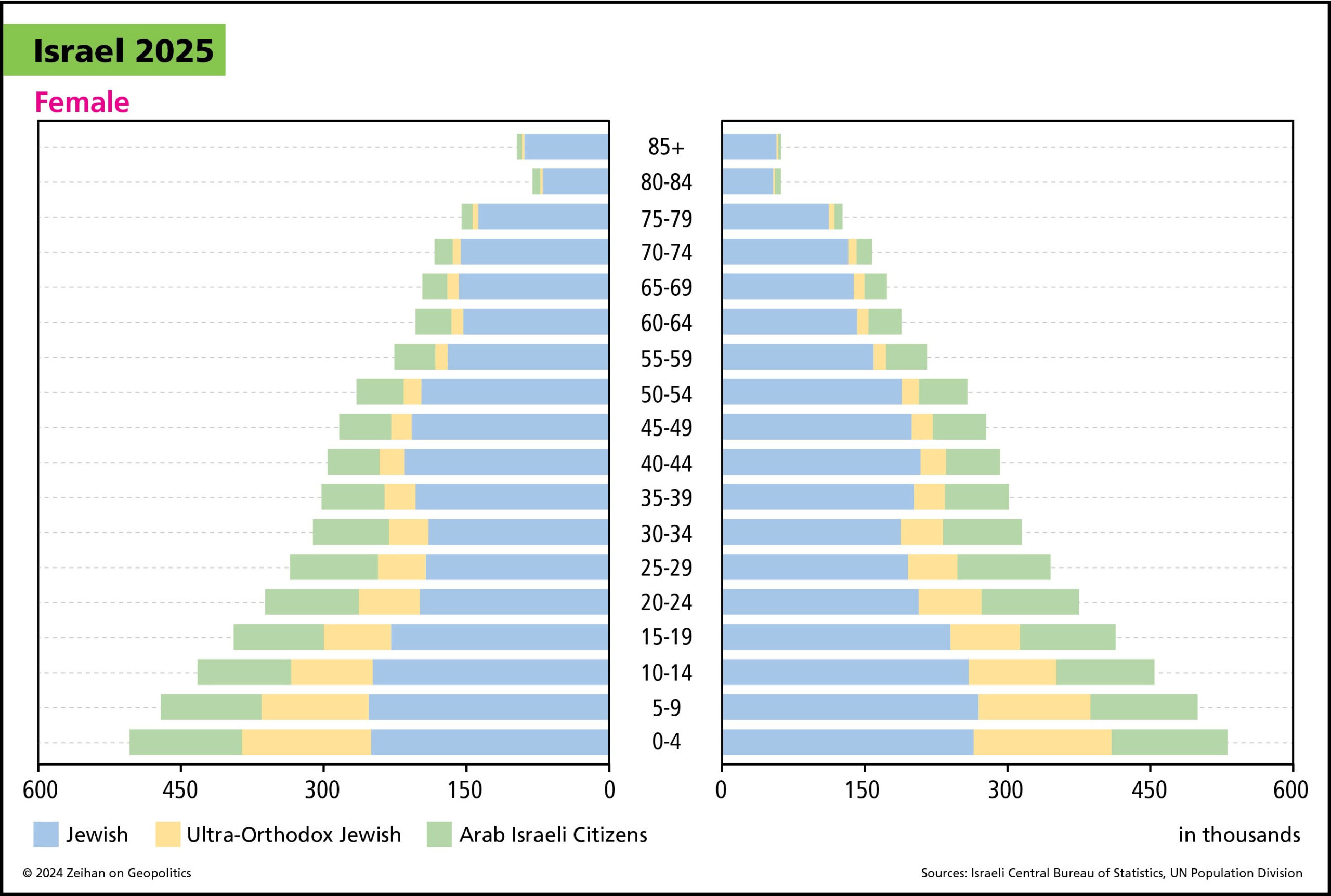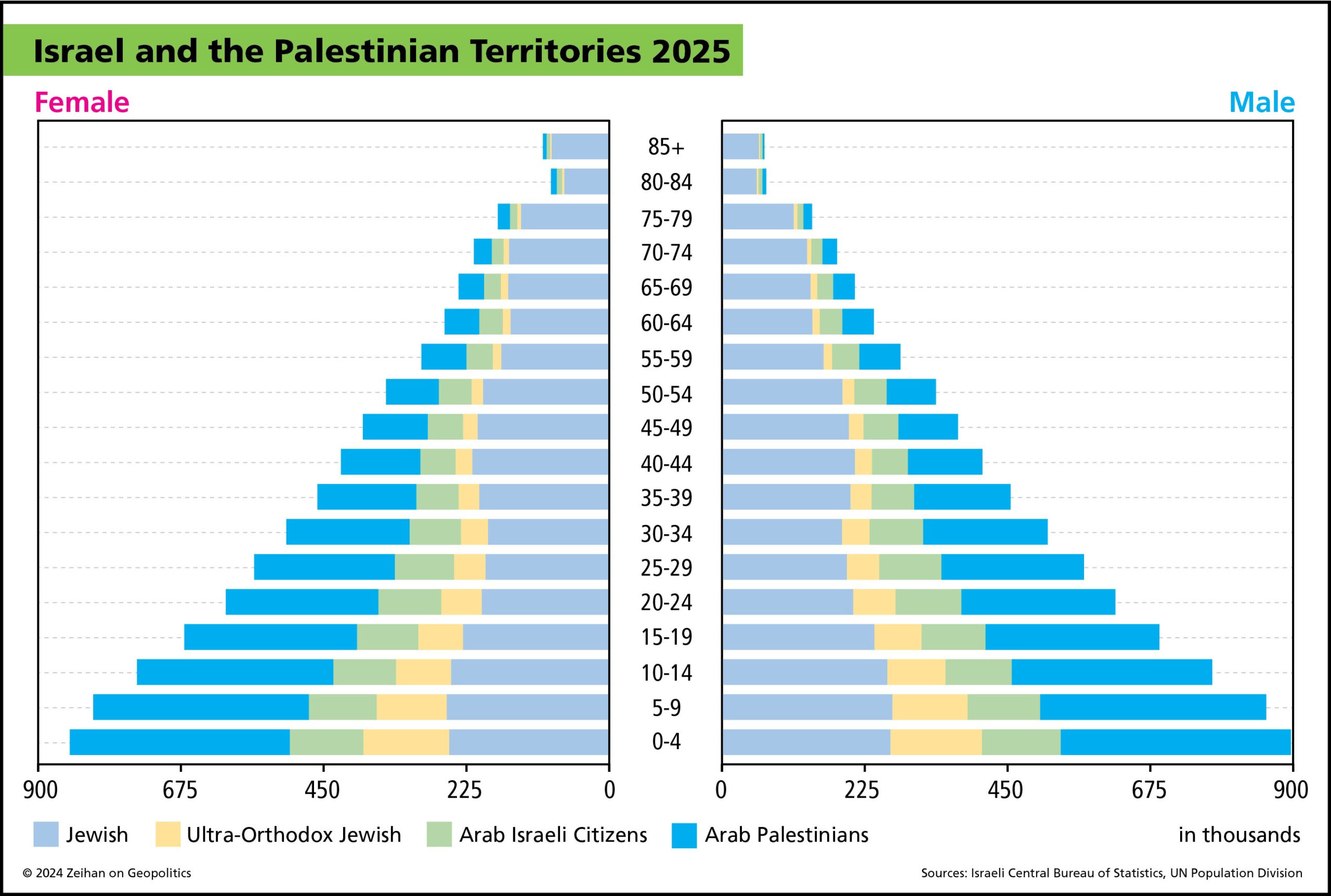The demographic pyramids below reflect the Israeli government’s best (public) understanding of the changing profile of its population. The two fastest-growing segments are Palestinian-identifying Muslim Arabs in Gaza and the West Bank, and the ultra-Orthodox Jewish Israelis. Not only do these two groups have starkly different ideas about what the future of disputed territories look like, they have increasingly little common ground with what one might call the more secular, moderate core of Israeli society at large.


The Israeli Supreme Court just ruled that the ultra-Orthodox community will no longer get exemption from military service. This addresses a number of long-standing issues, but it could spell trouble for Netanyahu’s political career.
The ultra-Orthodox community makes up 10-20% of the population, pays less taxes relative to their share of the population than secular Israelis, receives subsidies, has low labor participation…so until now, the rest of the population has been picking up the slack. By eliminating military exemption for the ultra-Orthodox community, that extra weight can be lifted from the remaining population.
As you would expect, the ultra-Orthodox aren’t thrilled with this decision and they’ll likely be making that known politically. Since the ultra-Orthodox parties are key supporters of Netanyahu’s coalition, don’t be surprised if we see some changes soon. This will only be amplified by criticisms of Netanyahu’s handling of the Hamas conflict and strategic incompetence.
Here at Zeihan On Geopolitics we select a single charity to sponsor. We have two criteria:
First, we look across the world and use our skill sets to identify where the needs are most acute. Second, we look for an institution with preexisting networks for both materials gathering and aid distribution. That way we know every cent of our donation is not simply going directly to where help is needed most, but our donations serve as a force multiplier for a system already in existence. Then we give what we can.
Today, our chosen charity is a group called Medshare, which provides emergency medical services to communities in need, with a very heavy emphasis on locations facing acute crises. Medshare operates right in the thick of it. Until future notice, every cent we earn from every book we sell in every format through every retailer is going to Medshare’s Ukraine fund.
And then there’s you.
Our newsletters and videologues are not only free, they will always be free. We also will never share your contact information with anyone. All we ask is that if you find one of our releases in any way useful, that you make a donation to Medshare. Over one third of Ukraine’s pre-war population has either been forced from their homes, kidnapped and shipped to Russia, or is trying to survive in occupied lands. This is our way to help who we can. Please, join us.
Transcript
Hey, everybody. Peter Zeihan here. Coming to you from square top mountain and back behind me is Argentine Peak. Edwards. And I think Kelso. It’s the 25th of June. And today we’re to talk about what’s going down in Israel. the Supreme Court just ruled that the country’s ultra-Orthodox, who have been granted exemptions from serving in the military for decades, can no longer give exemptions because it’s a discriminatory long term issue, is that, the ultra-Orthodox are somewhere between 10 and 20% of, Israel’s population, based on where you draw the number.
And since they pay very low taxes and qualify for all kinds of subsidies and don’t serve, most of them don’t work. And so they have high, very, very, very, very high birth rates, very, very low labor participation rates. And they don’t serve in the military. so there is an issue that has to become a larger and larger percentage of the population, just the the sheer weight of what, is then dropped on the shoulders of everybody else becomes almost insurmountable.
Keep in mind that there is an Arab minority in Israel that, secular, not like they’re protesting or throwing bombs or anything, but it’s a very real issue from a national identity and a social management point of view. there’s also a short term issue that has to do with the Netanyahu government. most of the parties that subscribe to ultra-Orthodox are part of Netanyahu, Prime Minister Netanyahu’s governing coalition, and have been for quite some time.
Israel’s had a lot of government the last 20 years when since Netanyahu kind of came into the burst on the field, he’s definitely their longest running prime minister overall. Anyway, what’s the best way I can put this into American terms? Think of Matt Gates. You know, the guy from Florida with really good hair, talks a lot of shit about the military, but thinks that the military is a solution to everything.
We should bomb this country and invade that country. But he’s never served. so take blowhards who don’t really contribute to the system, thinking that they know best about how to use military power. strip away the good hair and, the child sex trafficking charges and the drug charges or allegations. Excuse me. And basically, from a political point of view, you just described most of the ultra-Orthodox parties, in Netanyahu’s coalition.
So they talk a big game, but they don’t really contribute to the solution financially or in terms of, people with boots. there’s another issue, of course, and the whirlwind export havoc. And there’s also a very short term issue. After the Hamas assault on Israel back in October, Netanyahu was able to convince most of the parties in parliament, to form a unity government, because the feeling was the attack had been on everyone.
So everyone should have a say in how things unfold. since then, Netanyahu has not shared power with unity government all that much. And so party after party has left, accusing Netanyahu of not having a plan for the war, accusing Netanyahu of prolonging the war for his own political purposes in order to solidify his position as prime minister.
and, accusing him and the ultra-Orthodox overall of just general strategic incompetence because this attack shouldn’t have happened. Hamas is like the one thing that the Israelis are watching every single day. It’s there shouldn’t have been no surprise attack. And here we are eight months later, and there’s no sign that the war is going to conclude.
And in a number of places where Israel has supposedly already cleansed the area of Hamas fighters, they’ve popped up again. So, the international condemnation from the point of view of people who have left the Israeli government is now for nothing, because the Israelis have basically paid the price of launching a major war and, being at least indirectly complicit, a lot of unpleasantness.
But there’s still no sign that the war’s end is in sight. that means that, that Yahoo really, really needs the Orthodox to hold onto power while other parties in Parliament are actively agitating for fresh elections. We only take one significant coalition partner in, in India, whose coalition to force new elections in which, I would probably not do very well.
And you had throw the Supreme Court today into that mix, and you’re undoubtedly going to have at least some or ultra-Orthodox who think they might get a better deal with a different government, as opposed to having to serve in the military or actually be actively involved in changing the law so that their own people have to serve in the military, since they’re sitting in the government right now, when the case has been made.
Anyway, so significant decision changes things on the domestic and the international fronts. And that’s all I’ve got. All right. I got to cross this.








